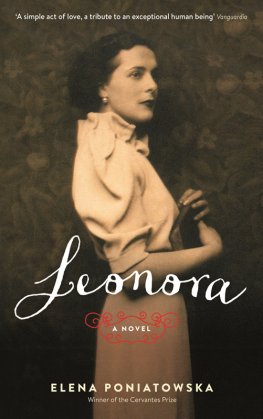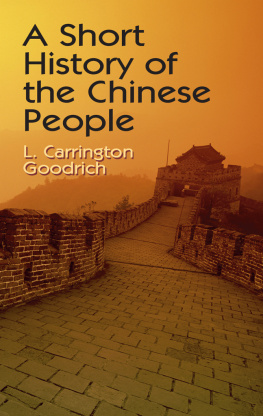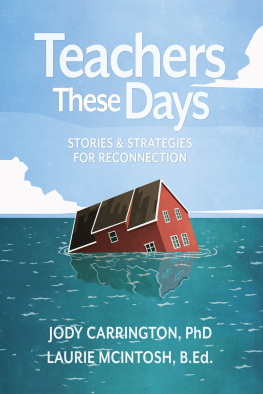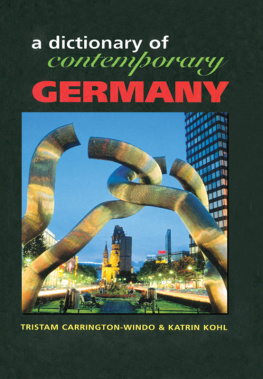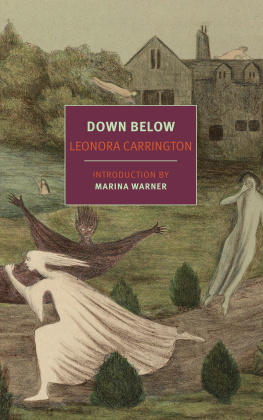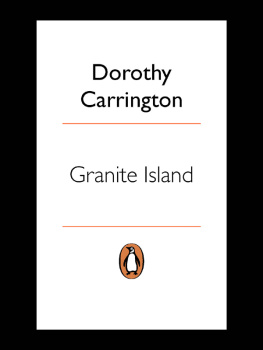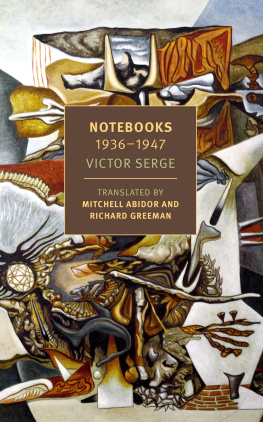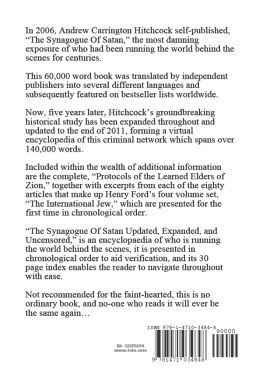ELENA PONIATOWSKA is Mexicos greatest living novelist. She lives in Coyoacn, a quiet suburb of Mexico City close to the Casa Azul, where Frida Kahlo, Diego Rivera and until his assassination Leon Trotsky resided. Fluent in English, French and Spanish, Poniatowska has published novels, non-fiction books and essays and been translated into over twenty languages. She is one of the founders of La Jornada, the feminist magazine Fern, publishing house Siglo XXI and Mexican national film institute Cineteca Nacional. For over fifty years she was a close friend of Leonora Carringtons, until the latters death in 2011.
AMANDA HOPKINSON has translated books from French, Portuguese and Spanish, mostly from Latin America. She also writes books on Latin American culture, particularly photography. A former director of the British Centre for Literary Translation, she is currently visiting professor in literary translation at City University, London.
Praise for Leonora
One of the most powerful voices in modern Hispanic writing Cervantes Prize citation
Masterful Poniatowska paints a picture of a troubled woman who personifies the dreams and nightmares of the twentieth century Biblioteca Breve Prize citation
A simple act of love, a tribute to an exceptional human being Vanguardia
THE DINING-ROOM TABLECLOTH is laid with dishes and around it are gathered the four children: Patrick, the eldest, is breakfasting on porridge, as are Gerard and Arthur; Leonora dislikes the stuff but the nanny, Mary Kavanaugh, says that when she reaches the middle of her bowl of oats shell find Lake Windermere, the biggest and most beautiful lake in all England. So the girl, spoon in hand, eats the porridge from the outside edge inwards, beginning to hear the sound of water and see how tiny waves ruffle its surface as she nears Windermere.
Of the boys three pairs of watching eyes, Gerards are her favourite because they smile.
The dining room is dark and gloomy, just like the rest of Crookhey Hall. Leonora has known soot since she was a child. Perhaps Planet Earth is one immense chimney. The smoke surging from the Lancashire textile mills accompanies her night and day. Leonoras father is the king of all this blackness, and he, the brilliant businessman, is the blackest of all of them. Even the men she sees out on the street are dark with soot. Her grandfather invented the machine that manufactures a blend of wool and cotton trademarked Viyella, and Carrington Cottons stands out proudly in a county where the air is always tinged with the factory ash. When her father, Harold Wilde Carrington, sells the company to Courtaulds, he becomes the main shareholder in Imperial Chemical Industries.
Crossing Crookhey Hall from one wing to the other requires a great many steps. The Gothic mansion accommodates the Carringtons father, Harold; mother, Maurie; the brother who follows Leonora around and is her playmate, Gerard; unlike Patrick, who is too grown up, or Arthur, whos too young. Two Scottish Terrier puppies, Rab and Toby, keep her company. Leonora kneels in front of Rab to look him in the eye and rub noses.
Are you walking on all fours? her mother asks her.
Leonora blows on Rabs face and he nips her.
What did you do that for? her mother asks in fear. He could give you a nasty scar.
If adults ask children why they do this or that it is because they lack the ability to enter that mysterious space shared by children and animals.
Are you telling me Im not an animal? an astonished Leonora demands to know.
Yes, you are a human animal.
But I know I am a horse, Mummy, inside I am a horse.
If that were true, your drive and strength would make you a filly, always launching yourself over every obstacle. Yet what I see before me is a girl all dressed in white with a medallion around her neck.
Youre wrong, Mummy, I am a horse dressed as a girl.
Tartar is the wooden rocking horse on which, since earliest childhood, she has gone riding several times a day. Gee-up, Tartar, gallop! Her dark eyes flash, her face points forward, her hair becomes a mane, and the reins swing wildly about the animals extended neck.
Get down at once, Prim, Nanny demands. Youve been on him for ages. If you dont dismount now, your father will come and put the bit between your teeth.
Harold Carringtons children are afraid of him. They live their lives apart, their domain being the nursery, and they are presented to their parents once a day. Occasionally, their parents require their presence for tea in either the living room or the library. They are only permitted to speak when spoken to. Milk or lemon? enquires their mother, her right hand holding the silver Sheffield teapot in the air. She has the odd habit of exclaiming: Someone has just spilt something on their clothes Someone is slurping their tea I can see black ink lodged under the fingernails of someone here Someone is pointing with their finger Someone else is tinkling their spoon in their teacup Someone here is not sitting up straight in their chair and the four children straighten up as one. Leonora watches the servants pass like draughts of air, barely if at all addressing her. The only ones who speak directly to her are her French governess, Mlle. Varenne, the nanny, and her brothers tutor, also responsible for giving her catechism lessons.
Adults keep asking Leonora: How are your studies coming along? Could you read aloud to me? Good manners belong on the walls with the heavy mirrors, with the footstools, the cups of boiling tea to be raised just so to avoid burning ones lips, the paintings of ancestors unable to share even a wink of complicity. Everything here is breakable, and it is essential to remain alert as to where you plant your feet.
Leonora, would you kindly inform me as to your progress in class? Harold Carrington regards her with sympathy. He relishes her intelligence. Leonora questions everything adults tell her, and this surprises him. His eyes follow her down the corridors of Crookhey Hall and find her charming. He will expend every effort and any amount of money on her.
Lessons unravel as interminably as the decades of a rosary. Twice weekly, fat little Mr. Richardson puts Leonora tortuously through her piano lesson. The girls long fingers span over an octave, and give the piano master every reason to assure Maurie that her daughter could make a good pianist. Each time Richardson inclines his head over the keyboard, his minuscule spectacles slide off, and Leonora conceals them so he has to beg her to give them back. Next comes fencing, then ballet, each bearing a strange similarity to the other: in both, you have to jump back and forth and land on target. She would prefer to be running wild in the garden with her brothers than taking classes in sewing and embroidery, and she pricks her fingertips in annoyance at being forbidden to go out.
The entire right wing of the house belongs to the children, along with the nanny and tutor that Harold and Maurie have assigned them. Mlle. Varenne eats at table with the parents, while the Irish nanny spends all day and night with the children, which is why they love her. One day, Mlle. Varenne was to be packed off back to France, Marseillaise and all. They had known for sure one day shed be off, but Mary Kavanaugh, never. Despite being small and skinny, her lap and her shoulder were always comforting to lean on. She magnetised them with her tales of the miniature people she called the sidhes.
Why cant I see them, Nanny?
Because they live underground.
Are they dwarves?
Theyre spirits which take on the form of bodies to emerge above ground.

